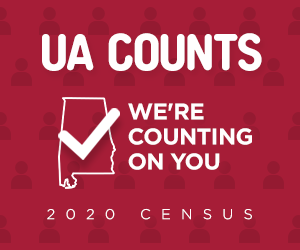
April 1 is national 2020 Census Day and Alabama, particularly Tuscaloosa, has a lot at stake — a direct impact on federal funding for the state and the possible loss of congressional representation.
“The goal is to count at least 80% of the state’s population because in the 2010 Census Alabama had only a 72% count, which was below the national average,” said Dr. Charles Nash, who’s served as vice chancellor for academic and student affairs for The University of Alabama System from 1992 to 2020.
“Of course, 100% would be the ideal outcome. If we don’t raise the percentage of people counted, we could potentially lose billions in federal financial support for the things that are important to us in our state, such as the opportunity to improve our quality of life through road improvements, resources for public works and business and community development programs.”
Nash said for every person not counted, a potential of about $1,600 per person per year for the next 10 years could be lost. The amount for those living outside of the Tuscaloosa region and other more densely populated areas would be lower.
Dr. Stephen Katsinas, director of the Education Policy Center at UA and a professor of higher education and political science, said since 1790 the House of Representatives has used the census for reapportioning of congressional seats. If Alabama cannot count another 10,500-19,500 people, at least one and possibly two of the state’s seven seats will be lost.
“Huntsville is growing and so is Baldwin County in southwest Alabama, so the seat will have to come out of the middle or southeast Alabama,” he said. “Which means that the rural population of Alabama will lose representation.
“We need to appreciate that the chair of the U.S. Committee on Appropriations is from Tuscaloosa. He was elected on April 1, 2018. It’s the first time in our 240-year history that the chair came from Alabama. So we have a tremendous role to play.”
Nash said the hardest people to count in Alabama are children, college students, those living in rural areas and people born in other countries. The census does not include a citizenship question and will not be used for any reason outside of its stated purposes.
“Everybody is to be counted, no matter if you’re a natural born citizen of this country, a nationalized citizen of this country, a child, a person who just happens to be living in this country on a visa or other documentation,” he said. “Everybody is to be counted.”
Jim Page, president of the Chamber of Commerce of West Alabama, said the decision of those who reside in Tuscaloosa to participate in the census in the next several weeks will determine what’s decided for the Tuscaloosa area for the next 10 years.
“Numbers matter,” Page said. “When we’re trying to reach restaurants and businesses to come here the first thing they look at is your city’s population.
“It would be really, really sad if we went backwards. It would hurt our recruitment. … We have one shot to get it right.”
For instructions on how to complete the U.S. Census and additional information, go to https://census.ua.edu/.
https://www.youtube.com/watch?time_continue=27&v=bcE5wXH17Os&feature=emb_title
Contact
Jamon Smith, Strategic Communications, jamon.smith@ua.edu, 205/348-4956
